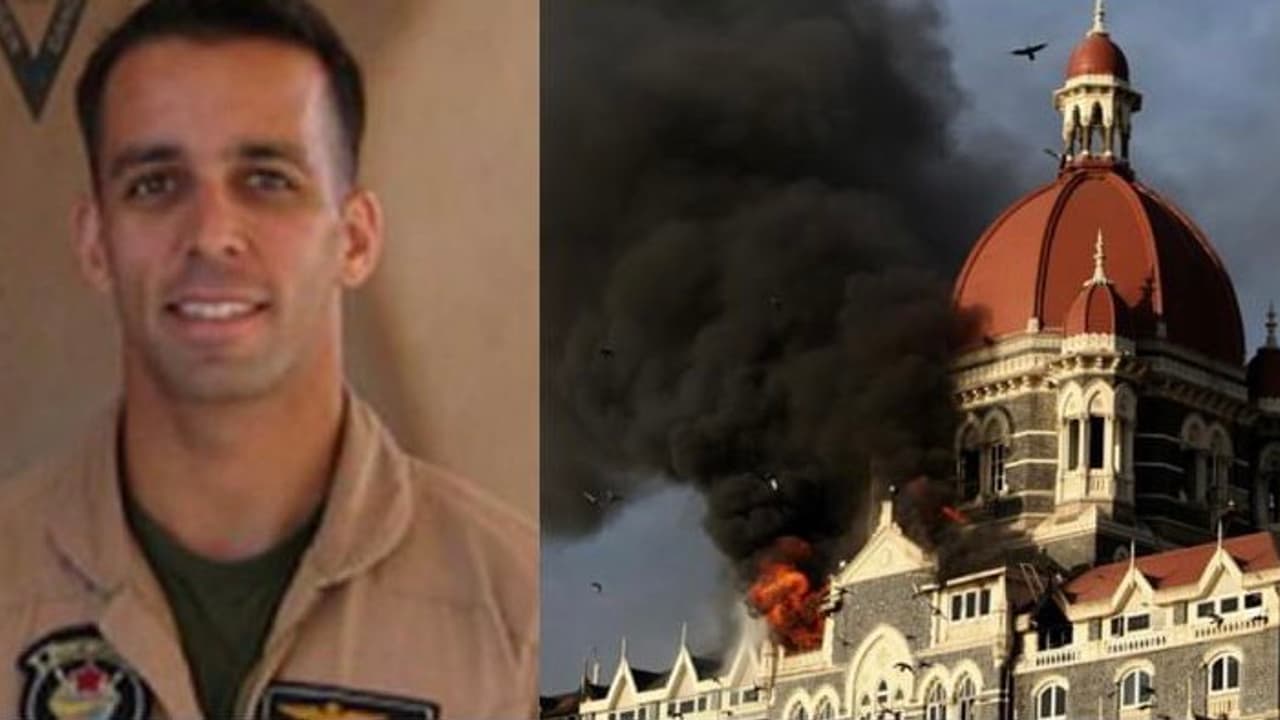Captain Ravi Dharnidhirka and the ex-commandos had led 157 terrified people out of a burning warzone. Their composure, courage and razor-sharp instincts under relentless crisis remain one of the most extraordinary acts of heroism from 26/11.
When terror engulfed Mumbai on November 26, 2008, a saga of extraordinary courage unfolded high above the burning city. As ten Lashkar-e-Taiba terrorists unleashed one of the most brazen assaults on India – 12 coordinated attacks over four harrowing days, leaving 159 dead and over 200 grievously wounded – the Taj Mahal Palace became the fiery epicentre of the nation’s agony. Yet within its blazing walls stood an unsung hero whose sheer grit and quick thinking saved 157 lives.
Remarkable story of Ravi Dharnidhirka
A former Captain in the US Marine Corps, Dharnidhirka had flown more than 200 combat missions in Iraq, including through the brutal siege of Fallujah in 2004. In November 2008, the 31-year-old Indian-American Marine had returned to Mumbai after over a decade, hoping for a quiet family holiday near Badhwar Park.
But destiny had different plans for him.
On the night of the attack, Ravi, along with his uncles and cousins, headed to Souk—the Lebanese rooftop restaurant on the 20th floor of the iconic Taj. As documented in The Siege: 68 Hours Inside The Taj Hotel by journalists Cathy Scott-Clark and Adrian Levy, Dharnidhirka felt a strange unease the moment he stepped inside. The metal detector beeped, yet the security staff waved him through. Soon after, phones across the restaurant rang in frantic unison. News of shootings in Colaba spread. Then came confirmation, the Taj was under attack.
Ravi instantly switched from holiday mode to battlefield instincts. Teaming up with a group of South African ex-commandos working for a private security firm, he took charge. The glass doors of Souk posed an immediate lethal threat—a single grenade would lead to catastrophic destruction. The commandos briefed the panicked diners while Ravi and another operative conducted a swift reconnaissance of the floor.
They discovered a conference hall with a thick wooden door and a nearby fire stairwell. Acting with military precision, they barricaded the stairway with furniture—tables, chairs, anything heavy enough to slow an armed assault. Taj staff were discreetly informed to unblock the stairs at a moment’s notice.
Moving swiftly through the kitchen, they herded terrified guests into the hall, arming themselves with whatever makeshift weapons they could lay hands on—knives, meat cleavers, iron rods. They knew these were inadequate against assault rifles, but they were prepared to resist, banking on the terrorists not expecting organised defiance.
Once inside, they darkened the hall, drew the curtains and blocked the doors with massive furniture. Phones were muted. Everyone was instructed to stay silent. One misplaced whisper could expose 157 helpless civilians.
Hours crawled by. Outside, explosions ripped through the hotel—two massive blasts as terrorists detonated RDX near the central dome and heritage tower, igniting an inferno. Flames began creeping upward. Dharnidhirka instantly realised the deadly implications: the fire could cut off escape routes or suffocate them if the power grid failed.
Rumours flew that security forces were approaching, but Ravi knew the reality—the terrorists’ firepower would delay any rescue. Time was running out.
Quietly, the team activated their escape plan. Commandos scanned corridors. Dharnidhirka dismantled the barricade with Taj staff and prepared the group for a stealthy evacuation. Phones off. Shoes off. Every footstep mattered.
Floor by floor, they descended the fire stairs in total silence. Each landing had a glass panel overlooking the lobby—one careless shadow could expose them. Women and children went first, guided by the commandos and Taj security. The men followed behind. Captain Dharnidhirka brought up the rear.
Midway down, he realised an 84-year-old woman could not possibly survive the exhausting descent of twenty floors. Without hesitation, he and a waiter lifted her up. She insisted she could be left behind. He refused.
After a tense, agonising descent, they finally emerged from the smoke-filled stairwell—alive.
Captain Ravi Dharnidhirka and the ex-commandos had led 157 terrified people out of a burning warzone. Their composure, courage and razor-sharp instincts under relentless crisis remain one of the most extraordinary acts of heroism from 26/11.
